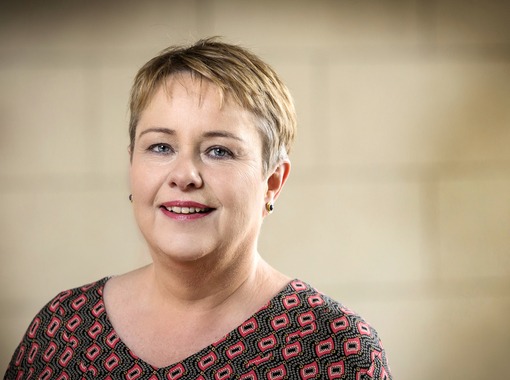"Nurses who care for young children know from their own experience that children can get very scared and anxious about anaesthesia. An unfamiliar environment, unfamiliar hospital staff, a fear of pain, and separation from their parents; all of these things can make children feel unhappy. Severe anxiety can have a very negative impact on the child's wellbeing, but also on the success and outcomes of the treatment," explains Brynja Ingadóttir, senior lecturer in nursing. Along with her colleagues, she has developed a video game to help children deal with this fear.
The game is called Mina and the Land of Dreams and is designed for children aged 4-8. It is available from both AppStore and Google Play and has already been released in three different languages: Icelandic, Finnish and English – and Brynja says that more languages could be added. "Children can play the game on their own or with parents a few days before the anaesthesia. They learn about how to get ready (e.g. fasting, washing), are introduced to the hospital environment (with a short video from inside an operating theatre), learn relaxation exercises, get positive reinforcement and encouragement to be brave, and win a prize at the end," says Brynja, adding that the game could also be helpful for people with developmental disabilities.
A trailer is available in all three languages on YouTube:
Video games are a good way to learn and acquire skills
Brynja says that the aim was to create a resource that educates children and teaches them how to deal with anxiety and fear. The game has been developed from evidence-based knowledge and technology. "Older solutions to this problem, such as hospital visits, games or clowns, have proved expensive, impractical, and not universally accessible – although they have been reasonably successful," says Brynja. She and her colleague Katrín Jónsdóttir, who is a nurse, have together founded the company NúnaTrix based on this idea and and other educational video games.
Brynja explains that the game was designed with input from preschool children who took part in workshops and usability testing. Educational video games are an interesting way to complement traditional teaching methods. "Video games have a lot of qualities that can encourage motivation and learning, for children as well as adults. In the healthcare sector, games are being designed for child and adult patients, but also to train healthcare professionals. This is a young branch of healthcare and there has been some criticism about the lack of thorough research alongside the design and release of these games," says Brynja.
Important to research the effects and usability of games
This is not a valid criticism in this case, however, because Brynja and her colleagues are conducting a study on the development and creation of the game, its usability and effect on anxiety, knowledge and self-belief, as well as the feasibility of introducing it into clinical practice. The team has already published one peer-reviewed paper in an academic journal, describing the development and testing of the game's usability.
"Testing revealed the high usability of the game and provided important information that was used to modify the game before publishing," says Brynja, adding: "We have also conducted preliminary research on the game, involving children who underwent anaesthesia at Landspítali University Hospital, as well as their parents. Similar research was also conducted in Finland. We are preparing an intervention study as well, which will be conducted in both countries, in order to investigate the impact the game has on anxiety, knowledge and other factors."
"The research team is made up of research scientists, experts in patient education, paediatric nursing and anaesthetic nursing, a multimedia specialist, a psychologist and a preschool teacher. A Finnish video game development company designed the game. This process was a collaboration between game designers, software developers, education experts and others," says Brynja, adding that the game's soundtrack is original and was recorded in Iceland.

Collaboration between a large group of experts
Creating a video game like this is a major project that requires diverse and interdisciplinary knowledge. The project is a collaboration between experts at the University of Iceland, Landspítali University Hospital, and the University of Turku in Finland. "The research team is made up of research scientists, experts in patient education, paediatric nursing and anaesthetic nursing, a multimedia specialist, a psychologist and a preschool teacher. A Finnish video game development company designed the game. This process was a collaboration between game designers, software developers, education experts and others," says Brynja, adding that the game's soundtrack is original and was recorded in Iceland. The project has received significant grants
from the Rannís Technology Development Fund; the Children's Welfare Fund; SUMARGJÖF – the Friends of Children Society; the Remembrance Fund of Landspítali University Hospital; and the Icelandic Nurses' Association Science Fund.
It is well aligned with the UI26 Strategy, which places significant emphasis on interdisciplinary collaboration and the development of knowledge to benefit the whole of society. "This project could yield important information about the entire process, from conception to use. We describe the development process, how we worked with young children to improve our ideas and how we tested the game, all with the goal of answering the million dollar question: Can people learn by playing video games?" says Brynja, explaining the significance of the project.
Patient education is the common research theme
Brynja has an extraordinary breadth of experience as a scholar and a nurse. She has worked with scientists in Sweden and Finland and recently launched a collaboration with a nursing faculty in Uganda, focused on nurse training and research. The experiences, wellbeing and educational needs of cardiac and surgical patients have been a major focus of her research, including translating and using a range of evaluation tools to assess the views and experiences of patients. Patient education is the common theme of her career, but Brynja says that communication skills and education for healthcare professionals is also an important focus for her. "Especially how we can use technology to create new resources, such as video games, and make better use of others such as websites, printed material and so forth. The ability of healthcare professionals to communicate well and educate patients face to face is also an interest of mine, because it is so valuable for patients when information is communicated appropriately," she concludes.
Brynja will be presenting the project and NúnaTrix at a lunchtime event on 19 May, designed to provide a quick introduction to start-up companies at the University of Iceland. The event is part of Innovation Week (https://www.innovationweek.is/), which will take place 16-20 May with the direct involvement of the University of Iceland.




